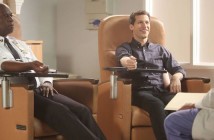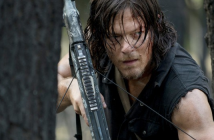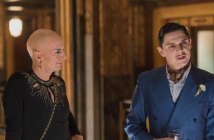November 7, 2015, 8:00 p.m. (EST), BBC
We’ve talked a lot, this season, in reviewing first parts of stories, about how vital the second part is to truly judging the thing. It is difficult to weigh in at the half way mark with any certainty of how the story will actually hold up when it is a complete object. There is only, really, one week in history when “The Zygon Invasion” and “The Zygon Inversion” will really be viewed as two separate halves. In future discussions, this will always be a complete story. And seen as that, it’s a little bit of a marvel. “The Zygon Inversion” is a flat out tour de force for Peter Capaldi, including basically a ten minute monologue wherein he gets to pull out every trick and every hairpin emotional turn in the Doctor’s wheelhouse. That monologue is not just the center of the episode, nor a high point of the season, but likely to stand the test of time as one of Capaldi’s defining moments in the role. It’s that good, and the complexity of that scene makes everything around it feel that much better.
It would be a crime to start anywhere other than that big speech, which is absolutely marvelous and works on multiple levels at the same time. Capaldi is just a master of skewing his delivery just so, like when he puts on the exaggerated American accent at various point, or manages to turn straight forward lines into tiny worlds of pain, anger, and tragedy with just slight modulations of his tone and delivery. Yet the story has actually subtly built to being as effective as it is here through a bunch of tiny steps. Having Clara be the story’s major Zygon double becomes brilliant when you realize the Doctor is speaking to a creature with the face of a companion he fears is becoming too much like him about how the creature has become too much like him. It also means that we, as an audience, have a level of empathy with Bonnie that would be difficult to conjure otherwise. Even at her most insane and zealous, we still see hints of her pain and humanity, because she is Jenna Coleman and we are used to sympathizing with that face.
But all of this perhaps undersells how magnificent the resolution here is. Frequently, on Doctor Who, endings are tossed off, a foregone conclusion where whatever cool things the episode has been up to stop so the Doctor can leap into action to prevent a massacre by an alien threat (for the most recent example of this, look no further back than “The Woman Who Lived”). Yet the “there’s nothing in this box, is there” resolution is an insanely clever extension of Moffat’s brilliant, John Rawls-inspired dangling thread from “The Day of the Doctor.” There, the Doctors brokered a peace treaty by forcing everyone behind what Rawls called “the veil of ignorance,” making sure no one knew what position they would exit negotiations in so that the negotiations would ultimately be completely fair to both sides. Here, though, the Doctor has created a situation where the horrors of a sudden human-Zygon war are writ small and where the participants cannot be sure they will not perpetuate the greatest horrors against their own side. Sure, it’s a little impossibly cute that the buttons are labeled “truth” and “consequences,” but what they stand for is stunning, as is the Doctor’s brilliant gamut to keep the peace no matter how many times he has to revisit this exact situation and wipe Kate Stewart’s memory. There’s a tragic beauty to that revelation, too, as the Doctor is basically pleading with Bonnie to end the cycle of violence, only to ultimately admit that his efforts to keep this peace are and endless cycle.
The episode also gives Clara (as opposed to just Jenna Coleman) something to do for the first time in ages, as she deftly negotiates an interrogation with none of her usual tricks available to her. Her dream sequence at the beginning is so brilliantly unnerving, I found myself wishing that was a much larger portion of the episode, but between her reactions there and the underplayed darkness of her trying to turn the gun on herself, there is some great material here for Coleman, and she does wonders with it.
The subplot about the Zygon Bonnie unmasks is also an unsettling tragedy writ small, and does a lot of the work of establishing the deeply personal stakes of this story. One of the problems Doctor Who runs into is that even when it thinks to create a race of aliens who are complex and have varying motivations, we inevitably have to spend the most time with the crazy or evil ones for the show to work. Here, we see in very little screen time what the average Zygon thinks of the treaty and their place on Earth, and it does wonders for the Doctor’s motivations and efforts to talk Bonnie down.
It’s true that “The Zygon Inversion” doesn’t solve all of the issues with this story (it ends up being fairly pro-assimilation, even if I can think of some pretty realistic and practical reasons this is so; it is interesting, and perhaps worth discussing, that Harness’ two stories both take on big modern political issues, arguably address both sides with nuance, and still theoretically end up in pretty conservative places. Consider this a possible trend to watch out for), but it is the first second part in this season to fully live up to the promise of the first one, and to craft a story that I think is ultimately incredibly satisfying. This is bound to go down as a high water mark of the Capaldi era, and a touchstone in terms of his portrayal of the Doctor. It’s not perfect, but its best moments are among the best this season, and even this series, has yet to offer. Well worth the wait of a week. Well worth even the lesser moments of this season.
The Roundup
- “Why do you have a Union Jack parachute?” “Camouflage.” “Camouflage?” “Yes. We’re in Britain.”
- “You’re talking nonsense to distract me from being scared. It’s one of your main character traits.”
- “London. What a dump.” “London’s ok.” “No it’s not, it’s a dump.” “You spend an awful lot of time here, considering it’s a dump.” “I spend an awful lot of time being kidnapped, tortured, shot at, exterminated. Doesn’t mean I like it.”
- “Why does peacekeeping always involve killing?”
- “I did this on a very important day for me. And this cease fire will stand.”
- “We’ve been left to fend for ourselves.” “So’s everyone.”
- “The only way anyone can live in peace is if they’re prepared to forgive.”
- “How are you going to protect your glorious revolution from the next one?”
- “Listen to me, listen! I just want you to think! You know what thinking is? It’s just a fancy word for changing your mind.”
- “This is all well and good, but we know that the boxes are empty now. We can’t forget that.” “No, but you’ve said that the last fifteen times.”
This is bound to go down as a high water mark of the Capaldi era, and a touchstone in terms of his portrayal of the Doctor.
-
AMAZING




